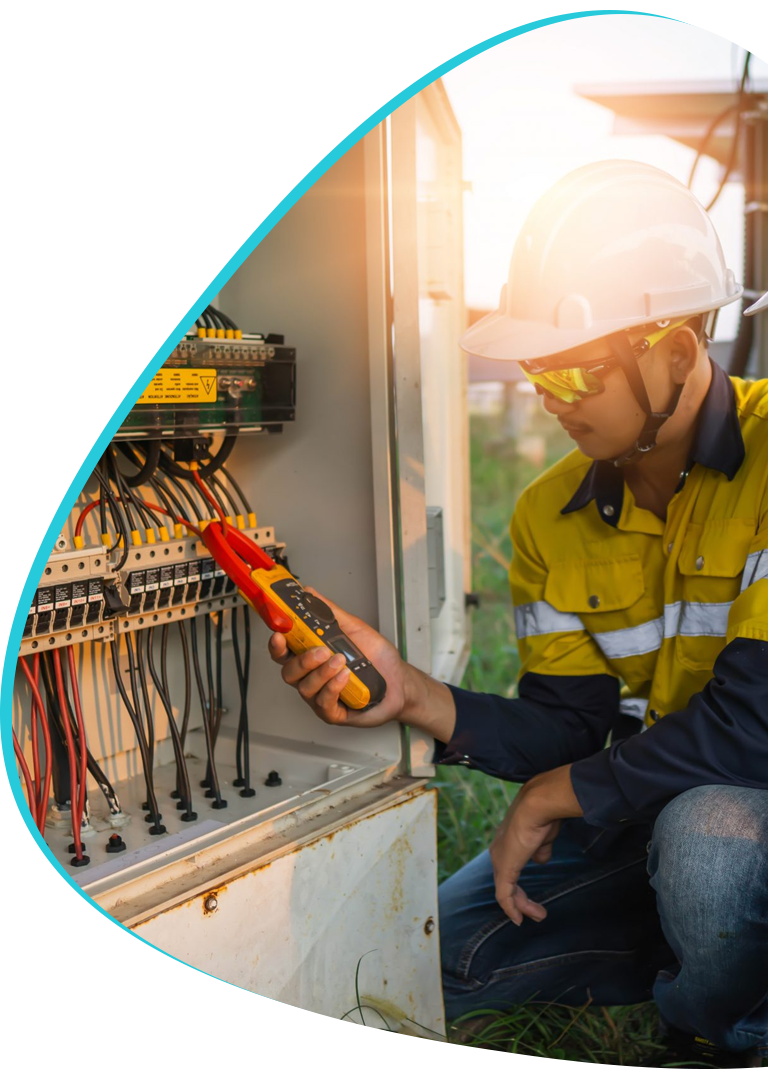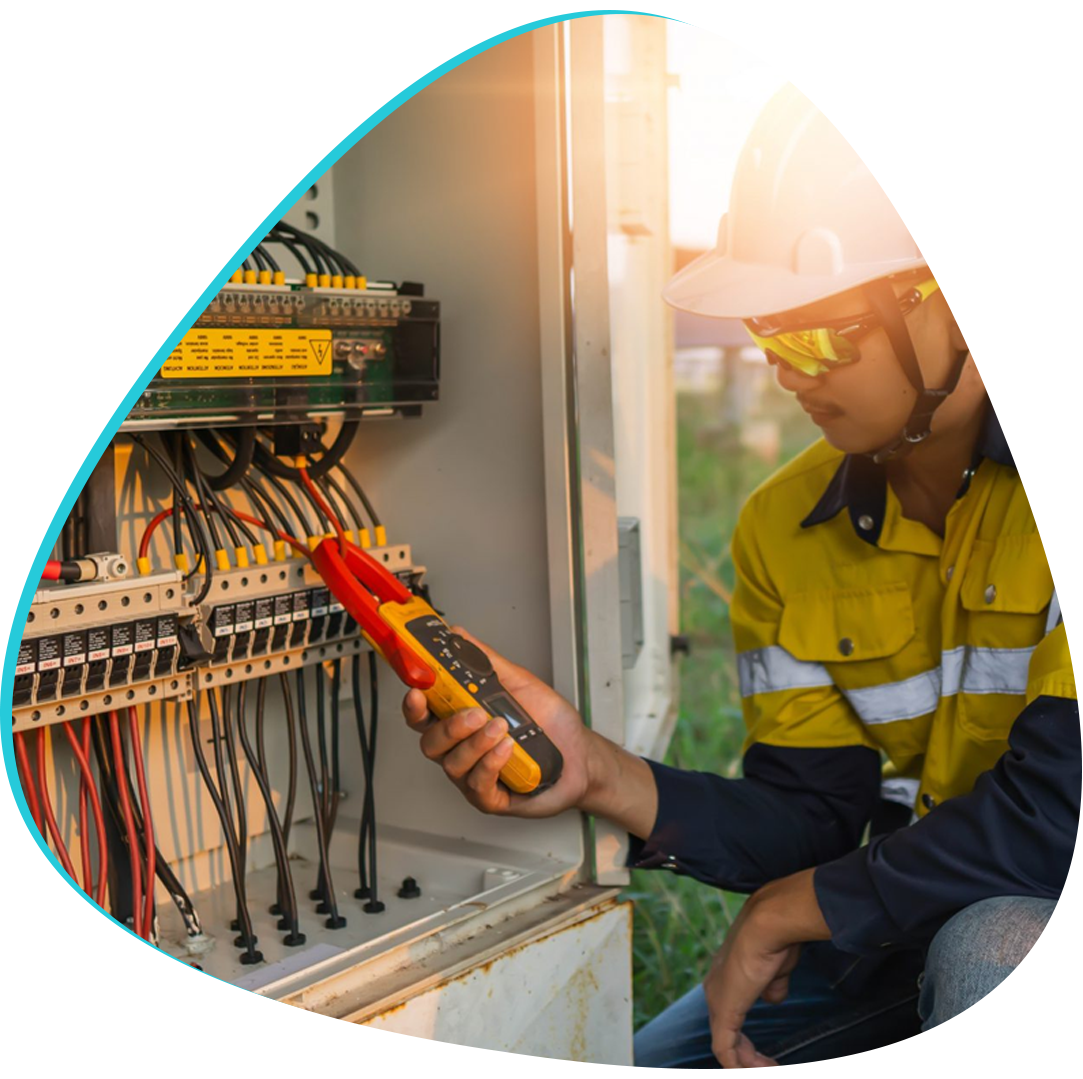We at Electric Works London help Landlord with EICR testing Certificate at cost effective prices in London. As Electricity is potentially hazardous. Therefore, it is a must for any electrical installation to meet regulated standards which helps to ensure safety. A faulty switch, an old fuse box/consumer unit, or a loose socket can cause serious damage to your property, belongings, and your well-being.
Statistics indicate that 20,000 cases of electrical accidents happen every year in the UK. 89% of these cases are caused due to electrical parts and malfunction of those parts, the remaining 11% is due to faulty wiring. Most of these cases can be avoided with regular maintenance of the electric system and setting in place, and of course, routine inspections in form of electrical testing for landlords is the most effective way to avoid incidents from happing.
Landlords and homeowners shoulderthe responsibility of ensuring safety to every tenant throughout a tenancy period in a given property. This is done by ensuring that every electrical appliance, fuse box/consumer unit and wiring is installed properly is in line with the newest regulations.
Routine EICR tests & Inspections are performed to detect any potential electrical issues that can be dangerous and hazardous. However, certain wires and cables remain out of sight and thus an electrician who is not experienced enough may overlook those hidden wires.
This is why you should always look for a skilled, qualified, and regulated electrician to conduct the test and inspection. The engineer will also be responsible for issuing the landlord electrical safety certificate (EICR) which proves your property conforms to safety regulations and standards and is safe from electrical hazards. Electric Works London’s engineers are all NICEIC registered and have over 25 years of experience in the industry. So, you can rest assured that we will conduct the inspection and required work with no complications.
Also known as an EICR inspection, electrical testing for landlords involves testing and inspection of electrical installations and circuits in both residential and commercial properties. It is relevant mentioning that EICR stands for Electrical Installation Condition Report. An EICR is known by various names including landlord electrical safety certificate, EICR inspection, and electrical safety certificate.
A fully qualified electrician has to carry out the inspection and testing, the engineer will use a testing device to carry out the inspection, through the testing the engineer takes multiple readings from the fuse box/consumer unit (CU) and circuits that are connected to it. Thorough inspection is carried out on both appliances and the wiring of the property to identify any sign of a fault, damage, corrosion, or any other condition that is a potential threat and against current regulations.
A comprehensively conducted EICR test will take no less than 1 to 2 hours depending on the size of the property. The EICR results will be based on the findings of the inspection. The report is sent to customers usually within 48 to 96 hours following the inspection.
The validity of an EICR certificate is dependent on several factors including the following:
Usually, a satisfactory Electrical Safety Certificate on a rental property remains valid for 5 years or till the end of tenancy, and unlike our competitors we offer the full 5-year certificate, so make sure when you are enquiring about EICR inspection the provider does offer the full 5-year certificate.

An EICR test serves five main purposes as follows:
Conducting an EICR test and inspection at routine intervals is advantageous in many ways
Regular testing gives you the peace of mind that your property is safe from electrical hazards. There is much less risk of injury and damage resulting from electrical incidents and shocks to your property and the people who are present.
When you have an updated Electrical Safety Certificate you prove you are aware of your responsibilities as a landlord and follow the regulation put in place, such as the following regulations:
An updated EICR proves you took the appropriate measures to ensure everyone on the property is safe from possible electrical incidents. Thus, in case of an electric shock or fire your updated EICR certificate is the best proof that you did not ignore your responsibility as a landlord or business owner towards your property and your tenants, staff, and customers.
It is a prerequisite for many insurance companies that you have your electrical systems tested regularly. If you want to claim for damages from a possible electrical fault, you have to substantiate that you took the appropriate measures to ensure electrical safety on your property and an updated EICR certificate is your best bet in that matter.
An EICR not only confirms the safety of your electrical system but also drives your attention to the areas of improvement thus helping reduce energy consumption and improving the carbon footprint of your property.
When your energy consumption is reduced, either you as a household or as a business start to save money. Identifying electrical faults is implied to correcting them on time before they cause severe damage.



There are several laws on health and safety that state as the landlord, you are the one who is legally responsible for the safety and welfare of your tenants. Similarly, business owners are responsible for the safety and welfare of their employees and customers. When your electrical system is not tested towards incidents that may occur, and thus an individual is injured or suffers damages from faulty electrical appliances or any means that is connected to the overall protection of your property’s electrical system, you will be the one who is at risk of being charged with negligence.
If you claim you are unaware of the condition of the electrical system in place on your property that will not build up a strong defense for acquittal. You can be charged for not complying with the Electrical Safety Standards and could be fined up to £30,000 as a penalty.
A landlord electrical safety certificate also helps to decide whether your insurer covers damages resulting from electrical faults to your property. If there is an accident or incident of fire and electricity is supposed to be the cause behind that then the court will inquire whether you were negligent on electrical safety. In absence of an updated EICR report, you will be considered as a culprit and thus may be denied compensation for the damages from your insurer. You not only have to bear the cost of repair and replacement from your pocket but also the legal cost as well if an employee or client takes legal action towards you.
An EICR is to be conducted by an experienced electrical engineer or electrician.
The contractor first discusses the operational limitations with the landlord while carrying out an EICR for both commercial and domestic properties. The inspection may need a few minutes of downtime during which servers and phone lines may have to be shut down.
Other limitations in the context include the areas of a property that the electrician should not access – like cables in the walls and the floors for which you may have to cut out the flooring or the plaster. A sampling rate is agreed upon by the electrician and the client that determines the percentage of sockets to be tested. Both parties may agree to increase the sampling size if any fault occurs during the testing or inspection.
The electrician has to disconnect the electrical installation from the main power supply of the property in question to perform an EICR test. The installation is checked based on the IET standards on wiring regulations.
Moreover, an EICR may reveal several issues including the following:


The average cost for an EICR Certificate for a two-bed flat range between £140 to £200 depending on the number of factors the cost is determined.
| Studio | One Bed | 2 Bed | 3 Bed | 4 Bed | Commercial |
| £150*+vat | £210*+vat | £240*+vat | £270*+vat | £320*+vat | From £350*+vat |
| £110*+vat | £140*+vat | £160*+vat | £180*+vat | £200*+vat | From £200*+vat |
*All of our prices for domestic properties are 100% fixed, with no additional cost check our pricing list for current discounts and sales on our testing and inspections.
**Additional discounts are available for EICR inspection and testing of multiple properties/premises.
As either a landlord or a building owner you want to ensure that every piece of electrical equipment and installation is safe for use and has minimal risk of electrocution and electric faults.
EICR test is the preeminent way to keep both your property and tenants safe. Electric Works London is committed to providing high-quality EICR inspection at reasonable cost to give peace of mind to both you and your tenants.
Here’s what makes us the choice contractor across London:
Usually, an EICR inspection lasts between one and four hours. The duration of the test varies from case to case depending upon certain factors. The factors include the size of a property, the accessibility of electrical systems, and of course the number of electrical equipment involved such as the consumer unit.
An additional inspection may be needed but that depends on the electrician’s findings from the comprehensive assessment.
After completing the inspection, the electrician issues an EICR certificate which you retain carefully until the next inspection. More than a certificate, it is a report detailing the overall condition of your installation. It also includes the remedial work required, if any work is essential.
An EICR specifies defects, damages, deterioration, and other conditions that could put both the property and those who are residing at the property at risk.
The results are unsatisfactory when your EICR report reveals issues in your electrical system. An unsatisfactory result means remedial work is to be carried out. Your electrician also provides a detailed price quotation for the remedial work.
The electrician indicates a code to specify the level or degree of the risk and the necessary action that is to be taken.
Code 1: Danger exists. Inhabitants or occupants are at risk of injury and the situation demands immediate action.
Code 2: Potentially dangerous. Urgent remedial measures are to be taken to make the electrical installation safe.
Code 3: Improvement recommended. This is the only EICR classification code that indicates your electrical system poses no threat or danger, although there is room for improvements.
FI: Further investigation is needed. This particular code means the contractor could not determine the safety of the installation and for that, he needs additional information or further investigation.
By the provisions in the Electrical Safety Standards, you have to resolve any electrical issue within 28 days from the day you received the recommendation from your electrician.
The electrician issues an EICR Certificate of Safety to verify that your electrical systems are safe only after the necessary corrective work is finished.
After getting the written confirmation from the electrician that further investigation or remedial work is required in the property, send a copy of that confirmation to every tenant within 28 days of finishing the corrective measures. A copy of the report also needs to be sent to the local housing authority within the same duration of time.
If you fail to take the corrective measures within the mentioned time slot you have to be charged with penalties. The local housing authority issues a request for you stating you have to resolve the remedial work within 21 days.
If corrective action is yet not completed within the specified time frame, an authorised person on behalf of the local housing authority enters into your premises to take remedial action.
As per the recommendations of the Electrical Safety Standards, an EICR should be conducted within five years. However, a competent electrician may recommend the test more frequently considering the following aspects:
Your EICR is nothing less than the documented fact that you complied with electrical safety standards. Furthermore, it establishes that you took reasonable steps to ensure the safety of the tenants in your property.
You are required to share a copy of EICR with the following individuals:
After conducting the inspecting and testing, the electrician applies a label to the electrical installation, which indicates the date of the next EICR test. The electrician also mentions that date on the EICR certificate.
The following tips will help you facilitate a smooth EICR test.
Hire a Qualified, Trained, and Skilled Electrician or an Engineer – it is better to hire an electrician possessing relevant accreditations like the National Inspection Council for Electrical Installation and the Electrical Contractors’ Association.
Read Up on Relevant Regulations – knowledge is power. Take out time to read and update yourself on electrical safety regulations.
Conduct a Preliminary Inspection of Your Property – Conduct a visual inspection of your property on your own, to list down visible problems. This proves helpful later when your contractor performs the EICR test.
Take Remedial Actions After a Visual Inspection – take remedial actions immediately after your visual inspection.
Inform your tenants in advance – Send a written intimation to every tenant that an EICR will be performed on so and so date. Also, state that they may face disruptions in their daily activities because of it.
For more information on the EICR test please feel free to contact us today!